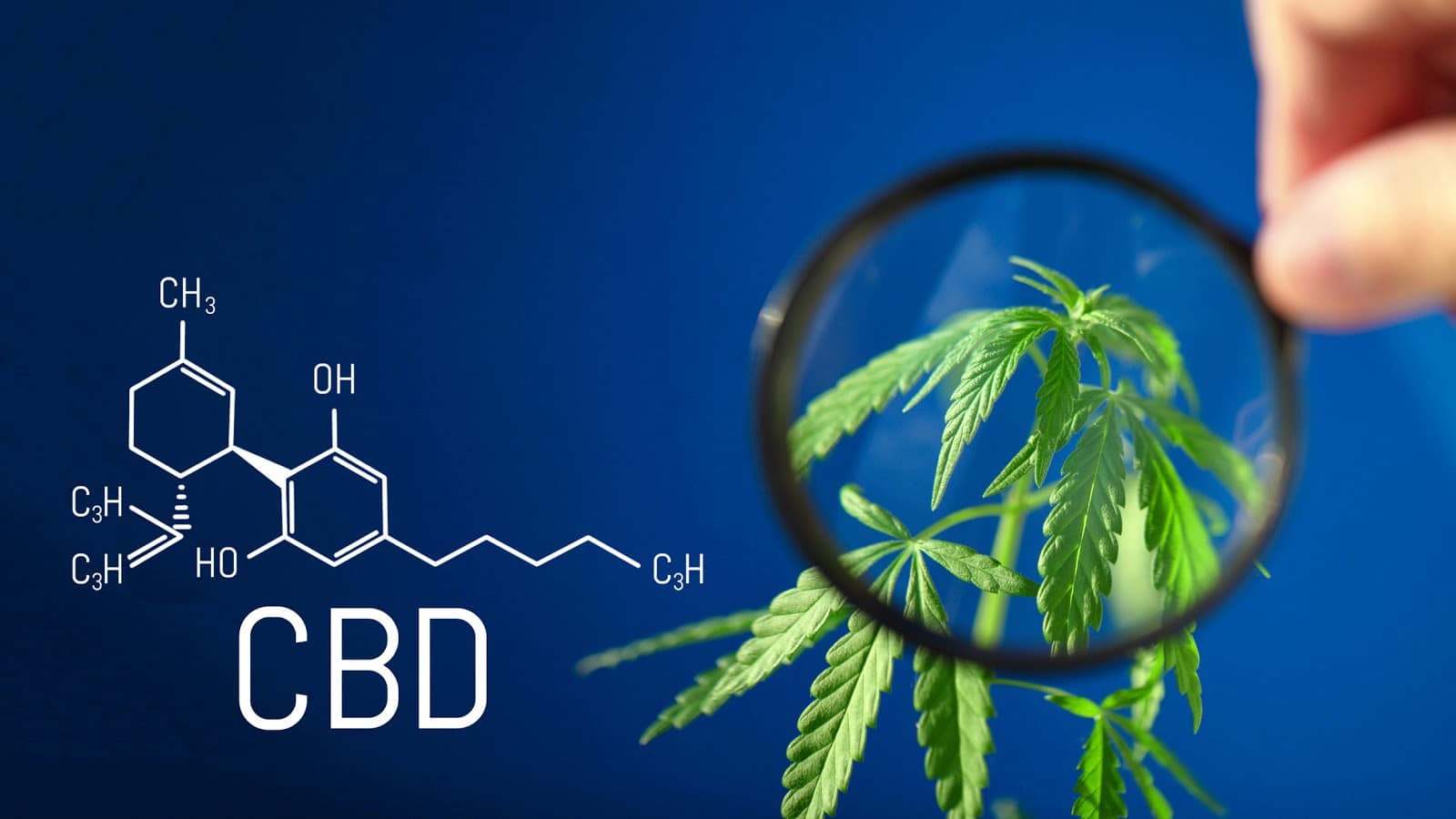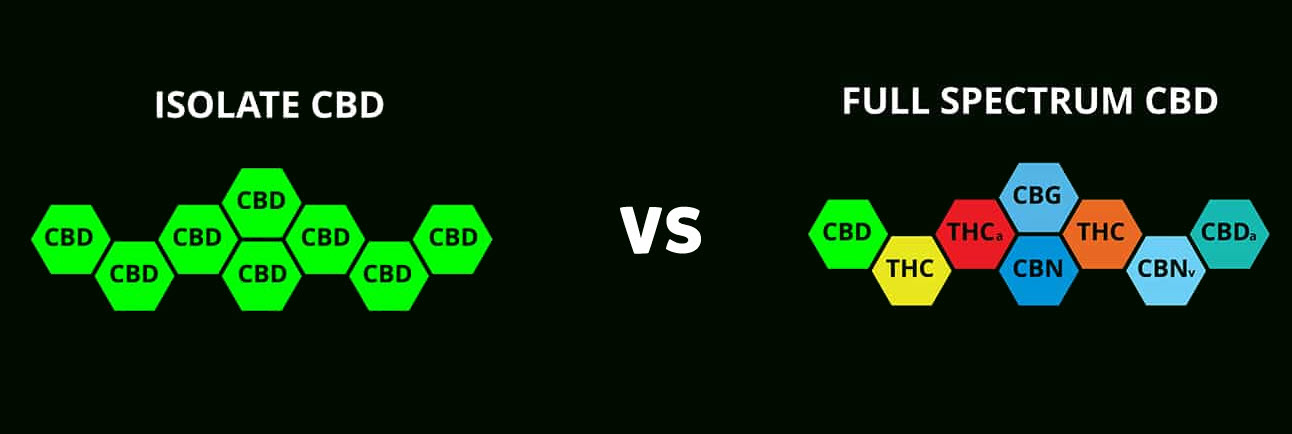How Can We Help?
Full Spectrum CBD VS. CBD Isolate - What's the difference?
The cannabis industry is one of the most exciting and fastest-growing in the natural health sector. With laws around the world relaxing on the plant and its commercial uses, we’ve seen some incredible new cannabis products come to market. The most popular of them all at the moment is cannabidiol oil, or more commonly known as CBD oil. With so many new and different CBD oil products available the choice of which one to go with can be difficult and confusing, with terms like whole plant extract, full-spectrum, broad-spectrum, and isolate. This article will break down the difference between two terms you’ll commonly see, full-spectrum CBD oil and CBD oil isolate, in order to help make your decisions easier.
Cannabidiol (CBD) is a non-intoxicating molecule found in the cannabis plant. It is one of many cannabinoids that can be extracted from the cannabis plant matter but it has become commercially popular beyond the others due to its wide medical applications and accessibility. As CBD does not give the consumer the famous high that cannabis is known for, it is more readily available online and in shops. It is usually derived from hemp, the name given to cannabis plants with less than 0.3% THC which can be mass grown for CBD oil.
Full spectrum CBD
The cannabis plant contains hundreds of different phytochemicals including cannabinoids, terpenes, and phenolic compounds. Full-spectrum CBD or hemp oil generally refers to products that not only contain CBD but contain other plant molecules as well. This version of CBD oil is minimally refined, leaving most of the cannabinoids and terpenes intact and in the oil. Full-spectrum means full-plant extract and has the benefit of providing most of the plant’s molecules in ratios and amounts that nature intended.
While there is still more research to be done, there are indications that show cannabinoids and terpenes work together to influence each other. This synergistic effect is called the entourage effect and has seen CBD work with THC to reduce the effects of a high and CBD to influence one’s own cannabinoid receptors.
CBD Isolate
Cannabidiol alone has been the subject of a lot of research as it stands out from the rest with what seems to be the widest therapeutic value. CBD isolate products are generally labeled as being 99% or more pure CBD depending on the form they come in and have been isolated down to just the CBD molecule. They have no other active ingredient and just aim to deliver therapeutic doses of CBD, isolated from the other cannabinoids and terpenes. CBD isolate products often come as a white powder or a mix with a carrier oil such as MCT oil for improved absorption.
Comparison
CBD and the other cannabinoids have therapeutic benefits to humans thanks to our endocannabinoid system, a series of cannabinoid receptors (CB1 and CB2) throughout the entire body. These receptors react to the cannabinoids our bodies produce which are molecularly very similar to the cannabinoids from cannabis.
Full-spectrum CBD oil products have the advantage of containing many different cannabinoids and terpenes and the potential for a wider health reach. A recent study indicated the synergistic effects of a full spectrum CBD oil were superior to an isolate in the effective treatment of inflammatory conditions. Terpenes alone have shown incredible potential for human health and should not be disregarded.
CBD isolates do allow users to easily get large amounts of CBD and know how much they’re getting. With the growing amount of evidence behind CBD and CBD alone it should definitely not be overlooked as a potential for so many conditions such as anxiety, pain, inflammation, diabetes, depression and more.
Often more expensive than full spectrum CBD, isolates have to undergo more extensive refinement and require more plant matter in order to get high levels of isolated CBD.
Conclusion
It’s hard to know which one is best for you without trying them both and see how you react. Different ailments might react differently a full spectrum CBD than to a CBD isolate. It might be worthwhile trying a cheaper full spectrum oil and asses how you react to it. If you’re finding your condition not reacting significantly to a full spectrum oil then bumping up the CBD through an isolate may be the way to go.
It’s still very early in the days of cannabis research but there is a strong case for the therapeutic benefit of a less refined full-spectrum oil with more of the plant compounds intact. There are so many beneficial health possibilities waiting to be unlocked by further studying the combinations of these cannabis compounds.
Remember, it’s not all about the amount of CBD per serving you see on a bottle. A higher CBD product isn’t necessarily superior to a full-spectrum oil. Leaving the plant extracts closer to the way nature intended could be a better option for most people.
At the CBD Oil NZ team we're looking to provide you with up to date information on CBD in New Zealand regarding new research and regulation.
Related Posts
All Posts

The History of Cannabis
The oldest known written record of cannabis comes from a Chinese emperor in 2727 BC while it has been found in Siberian burial mounds dating back to 3000 BC. Ancient Greeks and Romans then also started using it and it eventually spread west to Spain and the Americas.

Results of CBD oil in Human Trials
Cannabis has been used for thousands of years for medicinal and spiritual purposes. Since it was banned due to psychoactive effects, scientists focused on varieties with less tetrahydrocannabinol (THC) which causes those psychoactive effects. In such varieties, cannabidiol or CBD is the most prevalent cannabinoid and is responsible for many medicinal effects. CBD is mostly used as CBD oil which has been extensively studied since the middle of the 20th century. Here are some of the scientific findings from human trials.

The Cannabis Plant
Cannabis contains over 80 different compounds called cannabinoids where CBD and THC are a couple of the most abundant and well researched. The cannabis flower, present on the female cannabis plant is covered in resin glands where cannabinoids such as THC and CBD are extracted from. Cannabis resin is a dark to light brown substance which is scraped off the surface of the Cannabis Plant and pressed into a solid lump, sometimes referred to as hashish.
